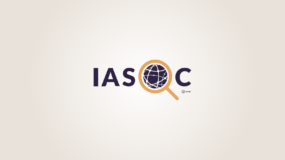Posted on 06 Oct 2025
Background
We are run by the Secretariat of the Global Initiative Against Transnational Organized Crime in close partnership with our Steering Committee. We have four annual prizes to honour the best and brightest in organized crime research, and we have an affiliated peer-reviewed journal, Journal of Illicit Economies and Development, which you can access online free of charge.
The IASOC Annual Prizes recognize outstanding contributions in the field of organized crime studies. IASOC is awarding prizes in four categories in 2025:
- Best Ph.D. Thesis / Dissertation
Ph.D. theses or dissertations on the topic of organized crime defended successfully three years before the year of the award (after 1 April 2022 for the current award cycle). Can be nominated by the candidate’s supervisor or department chair.
- Best Book
The Best Book recognizes the best book or monograph on the broadly defined area of organized crime. Books may be published on commercial or academic presses; self-published books are ineligible. Nominated books must be published no earlier than 2022. Books can be nominated by book publisher(s) or author(s).
- Distinguished Scholar
Scholars who have made significant advances in the study of organized crime throughout their careers.
IASOC Annual Prizes 2025 – Winners
- Best Ph.D. Thesis / Dissertation
No nominations were submitted for this category.
- Best Book
“Women of the Mafia: Power and Influence in the Neapolitan Camorra” (Cornell University Press 2024) by Felia Allum from the University of Bath (UK).
Abstract
Women of the Mafia dives into the Neapolitan criminal underworld of the Camorra as seen and lived by the women who inhabit it. It tells their life stories and unpacks the gender dynamics by examining their participation as active agents in the organization as leaders, managers, foot soldiers, and enablers. Felia Allum shows that these women are true partners in crime.
The author offers an innovative interdisciplinary analysis that demystifies the notion that the Camorra is a sexist, male-centric organization. She links her analysis of Camorra culture within the wider Neapolitan context to show how mothers and women act and are treated in the private sphere of the household and how the family helps explain the power women have found in the Neapolitan Camorra.
It is civil society and law enforcement agencies that continue to see the Camorra using traditional gender assumptions which render women irrelevant and lacking independent agency in the criminal underworld. In Women of the Mafia, Allum debunks these assumptions by revealing the power and influence of women in the Camorra.
About the author
Felia Allum is Professor in the department of Politics, Languages and International Studies at the University of Bath (UK). Her research focuses on organized crime, Italian Mafias, criminal mobility, gender and political corruption. She is the award-winning author of The Invisible Camorra.
- Distinguished Scholar
Dina Siegel, Professor of Criminology, Utrecht University
Dr. Siegel is a preeminent scholar whose research has significantly shaped the understanding of organized crime, transnational illicit markets, and criminal networks. Over the past several decades, her work has demonstrated a rare combination of empirical rigor, theoretical innovation, and policy relevance. Her ethnographic methodology makes her rather unique in that she is one of the few academics working on organized crime who has got down from her Ivory tower to talk and engage with those whom she studies. Her extensive fieldwork and meticulous data collection is to be commended. As a result, her research has illuminated the mechanisms of organized crime groups, including human trafficking, drug smuggling, illegal trade, and money laundering. She has contributed invaluable insights into the interplay between globalization and organized criminal activity.
One of Dr. Siegel’s most influential contributions has been her work on the intersection of migration and organized crime, offering a nuanced perspective on the ways in which criminal organizations exploit legal and political vulnerabilities. She has also been a leading voice in discussions on the role of culture and ethnicity in organized crime, challenging oversimplified narratives and advocating for evidence-based policymaking.
Dr. Siegel has authored and co-edited numerous seminal books and articles on organized crime, including The Mazzel Ritual: Culture, Customs and Crime in the Diamond Trade (Springer, 2009) and Contemporary Organized Crime: Developments, Challenges and Responses (Springer, 2021; co-edited with Hans Nelen). Her most recent book, The Israeli Mafia: A Cultural Journey into Israeli Organized Crime (Springer, 2024), further expands on her expertise, offering a comprehensive examination of Israeli organized crime through a cultural and socio-economic lens. This groundbreaking work explores the evolution of criminal organizations in Israel, their global networks, and their activities in drug and human trafficking, protection rackets, and contract killings. Dr. Siegel’s meticulous ethnographic fieldwork, media analysis, and firsthand visual documentation provide an unparalleled perspective on the intersection of crime, society, and governance in Israel.
Her scholarship is widely cited and has influenced both academic discourse and law enforcement strategies worldwide. Additionally, as an editor and mentor, she has played a crucial role in shaping the next generation of scholars in the field.
Beyond her academic achievements, Dr. Siegel has been actively engaged in bridging the gap between research and practice, collaborating with policymakers, law enforcement agencies, and international organizations. Her contributions to European and global efforts to combat organized crime have been instrumental in fostering more effective responses to these complex issues.
IASOC ‘s mission is to advance the study of organized crime and illicit enterprise. Sign up to our mailing list to receive regular updates on IASOC’s activities.



